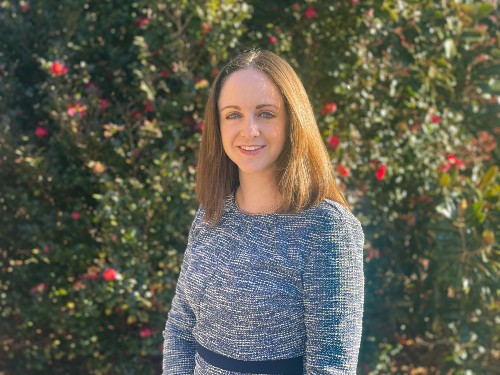History professor finds lessons learned valuable for herself, students
Published on: November 30, 2022

Allison Jobe had been working on restructuring her early United States history lectures at Guilford Technical Community College over the summer. By mid-July she had more new information than she could have imagined to incorporate into those lessons.
Jobe, an assistant professor in history at GTCC, was invited by the National Humanities Center (NHC) to attend a weeklong institute on teaching African American studies, part of a pilot project to promote more inclusivity in education.
This, the first of a series planned by the NHC, was titled "Understanding the Long View of the African Diaspora," showing how centuries of African displacement and relocation shaped American history and African American studies. The goal was to help students more fully understand the role that people of African descent have played in American society as laborers and citizens struggling for equality and the contributions they have made in engineering, medicine, art, science, music and other professions.
"If I had to describe the week in one word, it would be whirlwind. I’m still trying to wrap my head around it. I have studied this since graduate school, but there were so many new perspectives," said Jobe, who was one of 24 educators drawn from public and private schools in 16 states and Scotland.
"I already have incorporated some of what I learned into my classes. I was in the process of revisiting my U.S. History one lectures. I brought in some of the resources that I was made aware of from the presenters and other participants. They had a lot of advice for things that had worked well in their classrooms. There are lots of visual resources that provide a different connection to the past. It’s one thing to learn, another to see something interactive. For me, that can be emotional."
The institute, held in Durham, N.C., featured almost a dozen guest scholars who are leading figures in the study of African American history and culture. Some days as many as three different scholars addressed the group. Jobe said she furiously took notes and has yet to transcribe all of them. As she does, she keeps finding nuggets of information to pass along to her classes.
One of those scholars, Evelyn Brooks Higginbotham, professor of African and African American Studies at Harvard University, provided Jobe with a valuable and more importantly, useable lesson.
"She teaches about and lived through the birth of Black studies departments. She was there when many were founded and now, she studies them and where they were founded, who were the activists and the students," Jobe said. "She brought up a really interesting point. Many of the students who were advocating for a Black studies department were more community focused. They asked, 'What can we give back to our community?' It made me think about what I can do to make my classes more community oriented."
Jobe said perhaps the most powerful moment of the week came when an interactive time lapse map showed vividly the growth of the slave trade and its scope and reach.
"This map catalogues every ship that left Africa, how many enslaved men and women were aboard and where it went. You get an idea of how enormous the international slave trade was. It was very emotional."
Jobe has shown the interactive map to her classes, and they have been similarly moved.
"I have shared that with my classes, and we have talked about it," she said. "I had learned about that years ago, but seeing it spelled out like this over the summer sent chills up my spine. I could tell by some of my students' comments, they felt an emotional connection, too."
Back to All Articles